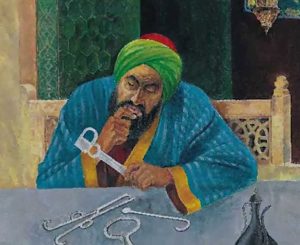“Discover the life and legacy of Abu Al-Qasim Al-Zahrawi, the Father of Modern Surgery. Explore his groundbreaking contributions to medicine and surgery in this comprehensive biography.”
Abu Al-Qasim Al-Zahrawi: Introductory
Abu Al-Qasim Al-Zahrawi, also known as Albucasis, was a renowned Arabian thinker, physician, and writer who lived from 936 to 1013. He was born in Al-Andalus (modern-day Spain) and lived during the height of the Islamic Golden Age, a period of great intellectual, cultural, and scientific advancement in the Islamic world.
Abu Al-Qasim Al-Zahrawi was a physician who made significant contributions to the field of medicine, particularly in the areas of surgery and pharmacology. He was a prolific writer and is best known for his medical treatise “Kitab Al-Tasrif,” which was a comprehensive medical encyclopedia that covered a wide range of medical topics including anatomy, surgery, pharmacology, and obstetrics and gynecology.
In “Kitab Al-Tasrif,” Al-Zahrawi documented his surgical techniques, many of which were innovative and ahead of his time. He was the first physician to describe and illustrate many surgical instruments, including the scalpel, forceps, retractors, and curettes. He also described surgical procedures such as caesarean section, lithotomy, and the treatment of fractures and dislocations.
In addition to his contributions to medicine, Al-Zahrawi was also a skilled pharmacist and wrote extensively about the use of drugs in the treatment of various diseases. He compiled a comprehensive list of drugs and their uses, which served as a valuable resource for subsequent generations of physicians.
Abu Al-Qasim Al-Zahrawi ‘s impact on the field of medicine was significant, and his work was widely read and respected for centuries after his death. His treatise was translated into Latin and became a standard text in European medical schools during the medieval period. 0 0 0.
Abu Al-Qasim Al-Zahrawi: Comprehensive Biography
Introduction
Abu Al-Qasim Al-Zahrawi, known in the West as Albucasis, was a pioneering figure in the history of medicine and surgery. Born around 936 CE in Al-Zahra, near Cordoba, in the Andalusian region of modern-day Spain, Al-Zahrawi is often referred to as the “Father of Modern Surgery.” His comprehensive works, particularly the *Kitab al-Tasrif*, significantly influenced both Islamic and European medicine for centuries.
Early Life and Education
Abu Al-Qasim Al-Zahrawi was born during the Islamic Golden Age, a period marked by remarkable advancements in science, culture, and philosophy. He likely received his early education in Cordoba, a thriving cultural and intellectual hub. Details of his personal life are sparse, but it is believed that he was deeply influenced by the rich scholarly environment of Andalusia, where Greek and Roman texts were translated and studied extensively alongside Islamic and other works.
Contributions to Medicine and Surgery
Al-Zahrawi’s most celebrated work is the *Kitab al-Tasrif*, a 30-volume medical encyclopedia that covers a broad range of medical topics. The final volume, which deals with surgery, is particularly noteworthy and was the first illustrated surgical manual ever published. It describes over 200 surgical instruments, many of which were designed by Al-Zahrawi himself, and provides detailed descriptions of surgical procedures. This work remained a primary surgical reference in Europe for nearly 500 years after his death.
Al-Zahrawi’s Significant Contributions
Surgical Techniques and Instruments: Abu Al-Qasim Al-Zahrawi introduced numerous innovative surgical techniques and instruments, such as the use of catgut for internal stitching, a practice that remains a standard in modern surgery. He also developed methods for removing kidney stones, treating ear conditions, and performing complex dental surgeries.
Obstetrics and Gynecology: Al-Zahrawi was a pioneer in this field, describing procedures for difficult childbirths and developing several instruments for gynecological surgeries.
Pharmacology and Cosmetics: He explored various medicinal preparations, including methods for compounding medicines. He also wrote on the therapeutic use of certain foods and cosmetics, including the use of perfumes and aromatic substances.
Medical Education: Al-Zahrawi was deeply concerned with medical ethics and education. He stressed the importance of training and experience in surgery and encouraged physicians to maintain high ethical standards, emphasizing the welfare of the patient above all.
Influence and Legacy
Abu Al-Qasim Al-Zahrawi ‘s ‘Kitab al-Tasrif’ was translated into Latin by Gerard of Cremona in the 12th century, becoming a cornerstone of medical education in medieval Europe. The influence of his work extended to the Renaissance, shaping the development of modern surgical practices.
He is remembered not only for his technical contributions but also for his emphasis on the humane treatment of patients and the professional responsibilities of physicians. Al-Zahrawi’s legacy as a medical pioneer is evident in the continued use of many of his surgical techniques and instruments.
Death and Commemoration
Abu Al-Qasim Al-Zahrawi passed away around 1013 CE. His contributions continue to be recognized and honored, both in the Muslim world and the West. His work remains a testament to the rich scientific heritage of Islamic civilization and its profound impact on the development of medicine. 0 0 0
.
Abu Al-Qasim Al-Zahrawi: Facts
Abu Al-Qasim Al-Zahrawi, also known as Albucasis, was a prominent Andalusian physician and surgeon. Here are some key facts about him:
- Full Name: His full name is Abu Al-Qasim Khalaf ibn al-Abbas Al-Zahrawi.
- Birth and Death: He was born around 936 CE in Al-Zahra, near Cordoba, Spain, and died around 1013 CE.
- Father of Modern Surgery: Al-Zahrawi is often referred to as the “Father of Modern Surgery” due to his pioneering contributions to the field.
- Primary Work – ‘Kitab al-Tasrif’: His most famous work is the ‘Kitab al-Tasrif’, a 30-volume medical encyclopedia covering various aspects of medicine, including surgery, pharmacy, and orthopedics.
- Surgical Innovations: He described and illustrated over 200 surgical instruments, many of which he invented. His designs for forceps, scalpels, and catheters were groundbreaking.
- Use of Catgut for Sutures: Al-Zahrawi introduced the use of catgut (made from animal intestines) for internal sutures, a practice still used today.
- Burn Treatment: He developed techniques for treating burns using medicinal concoctions and designed methods to prevent the formation of scar tissue.
- Early Use of Anesthetics: He discussed the use of various herbal remedies and sedatives to reduce pain during surgical procedures.
- Gynecology and Obstetrics: Abu Al-Qasim Al-Zahrawi wrote extensively on women’s health, describing procedures for managing difficult childbirths and inventing several gynecological instruments.
- Dental Surgery: He provided detailed descriptions of dental procedures, including tooth extraction and the treatment of fractured jaws, making him one of the earliest practitioners to specialize in dentistry.
- Influence on European Medicine: His works were translated into Latin in the 12th century and became standard texts in European medical schools, influencing Western medicine well into the Renaissance.
- Medical Ethics: Abu Al-Qasim Al-Zahrawi emphasized the importance of good bedside manners, the ethical treatment of patients, and the need for careful documentation of medical procedures.
- Legacy: Al-Zahrawi’s contributions to surgery and medicine are still recognized today. His name and works are commemorated in various forms, including medical colleges and hospitals worldwide.
Al-Zahrawi’s work laid the foundation for modern surgical techniques and established him as one of the most influential figures in the history of medicine. 0 0 0
Abu Al-Qasim Al-Zahrawi: FAQs
Here are some frequently asked questions (FAQs) about Abu Al-Qasim Al-Zahrawi:
Who was Abu Al-Qasim Al-Zahrawi?
Abu Al-Qasim Al-Zahrawi, also known as Albucasis in the West, was an eminent Andalusian physician and surgeon from the Islamic Golden Age. He is often regarded as the “Father of Modern Surgery” due to his pioneering contributions to the field.
What is Al-Zahrawi most famous for?
Al-Zahrawi is best known for his comprehensive medical encyclopedia, *Kitab al-Tasrif*. This 30-volume work covers various medical topics, with the final volume focusing on surgery and illustrating over 200 surgical instruments.
What did Al-Zahrawi contribute to surgery?
Al-Zahrawi developed numerous surgical techniques and instruments, many of which are still in use today. He introduced the use of catgut for internal sutures and created various surgical tools for procedures like bone setting, tooth extraction, and ear treatment.
Why is Al-Zahrawi called the ‘Father of Modern Surgery’?
He is called the “Father of Modern Surgery” because he wrote the first comprehensive and illustrated surgical manual. His methods and instruments laid the groundwork for surgical practices in both the Islamic world and Europe.
When and where did Al-Zahrawi live?
Al-Zahrawi was born around 936 CE in Al-Zahra, near Cordoba, in present-day Spain. He lived during the Islamic Golden Age and died around 1013 CE.
What was the ‘Kitab al-Tasrif’?
The *Kitab al-Tasrif* is Al-Zahrawi’s 30-volume medical encyclopedia. It covers a wide range of medical topics, including pharmacology, surgery, orthopedics, and gynecology. The last volume, which focuses on surgery, is considered his most significant contribution to medical literature.
What are some of Al-Zahrawi’s surgical innovations?
Some of his key innovations include the use of catgut sutures, the design of numerous surgical instruments, and detailed descriptions of surgical procedures like tracheotomy, lithotomy (removal of bladder stones), and the management of dislocated shoulders.
How did Al-Zahrawi influence European medicine?
Al-Zahrawi’s works were translated into Latin in the 12th century and became a primary reference for European medical education for several centuries. His surgical techniques and instruments were used and refined by European surgeons well into the Renaissance.
What fields of medicine did Al-Zahrawi contribute to?
In addition to surgery, Al-Zahrawi made significant contributions to fields like obstetrics, gynecology, dentistry, orthopedics, and pharmacology.
What ethical principles did Al-Zahrawi advocate for?
Al-Zahrawi emphasized the importance of ethical medical practice, patient care, and professionalism. He advised doctors to prioritize patient welfare, maintain confidentiality, and continually improve their skills through learning and practice. 0 0 0
Sources:
- “Kitab Al-Tasrif” by Abu Al-Qasim Al-Zahrawi
- “A History of Medicine” by Lois N. Magner
- “Encyclopedia of Islamic Medicine” by M. I. H. Farooqi
- “Albucasis: On Surgery and Instruments” edited by Michael R. McVaugh.
N. B. This article originally belongs to the book, ‘Brief Biographies of Ancient Thinkers and Writers‘ by Menonim Menonimus.
Books of Biography by M. Menonimus:
- The World Writers-Brief Biographies
- Introduction to World Writers
- Introduction to World Personalities
- Love of Reputed Persons ..
Additional Searches:











